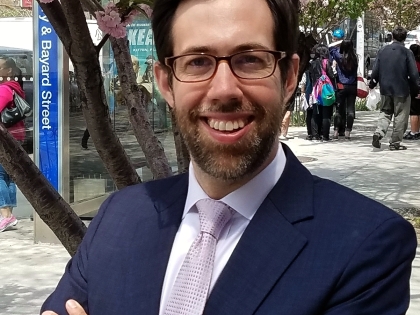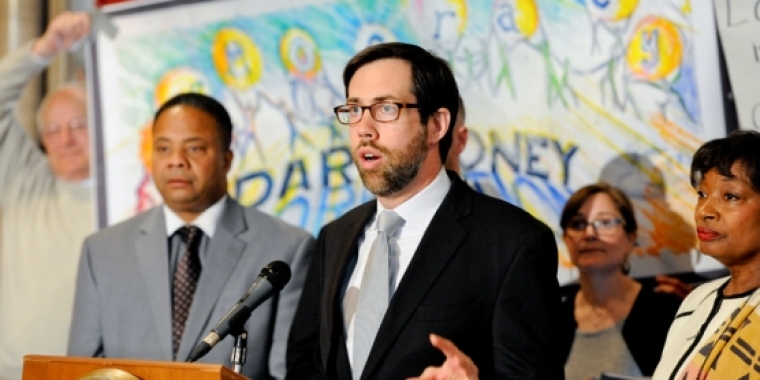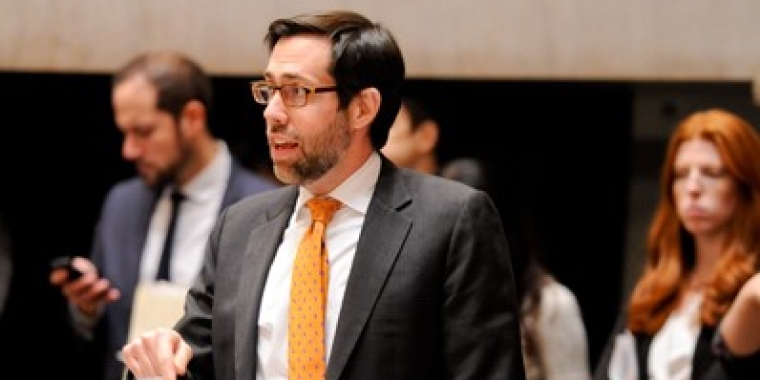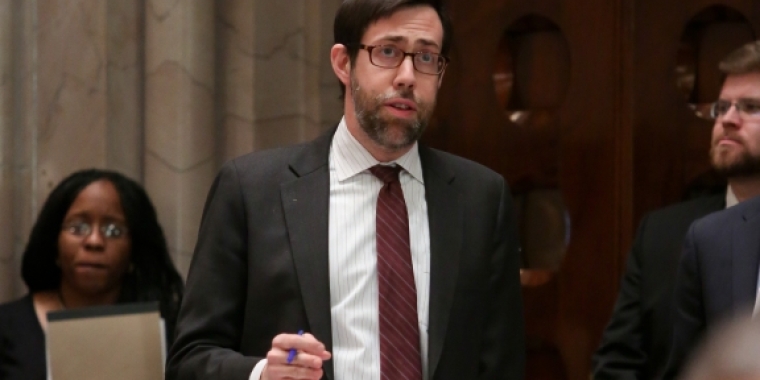
Squadron, Parks Advocates Urge Large Conservancies to Join Neighborhood Parks Alliance & Ensure More Equity Across Nyc Parks
June 1, 2013
With Pools on Chopping Block, Squadron Calls for Increased Parks Funding
Squadron Also Announces Legislation to Require Participation of Well-Funded Conservancies in Alliance
LOWER EAST SIDE – With pools in low-income neighborhoods on the chopping block this summer, and disparities between parks around the city continuing to grow, State Senator Daniel Squadron and parks advocates are calling on large, well-funded park conservancies to join Squadron's proposed Neighborhood Parks Alliance to ensure more equity across the city's 1,700 parks, and urging an increase in parks funding. Squadron was joined by parks advocates at Sara D. Roosevelt Park on the Lower East Side.
Squadron and representatives of parks from around the city urged an increase in parks funding. Funding would forestall the closure of pools in East Harlem, Brownsville, Fort Totten Park in Queens, and Staten Island, prevent the potential closure of all city pools two weeks early this year, and allow key improvements to parks in need throughout the five boroughs.
Squadron and advocates also urged large, well-funded conservancies to join Squadron's proposed Neighborhood Parks Alliance, which would create partnerships between conservancies and "member parks" in need of money and support. Squadron announced today that he is introducing legislation that would require city park conservancies with operating budgets of over $5 million to participate in the Neighborhood Parks Alliance. A bill summary is included below.
Under Squadron's proposal, conservancies would join the proposed Neighborhood Parks Alliance as “contributing parks” to create more equity across the city’s parks. A contributing park would commit 20 percent of its conservancy’s budget to member parks in need. Parks in need would become members by gathering signatures from local residents, establishing their own conservancy group, and receiving commitments from the Parks Department and local Council members to at least maintain current government funding levels.
Disparities between well-funded, well-maintained parks (which are often heavily financed by private donations), and parks in lower-income neighborhoods have continued to grow in recent years.
Central Park Conservancy, for instance, has an annual operating budget of nearly $40 million, received a $100 million donation last year, and recently announced a $40 million fundraising campaign to improve the park’s playgrounds. Others that don’t receive generous private funding, like St. Mary’s Park in the South Bronx or Flushing Meadows Corona Park in Queens, are plagued with seat-less bleachers, cracked pathways, and pervasive litter and graffiti.
Senator Daniel Squadron said, "In a city as large and dense as ours, it’s unacceptable that good parks and pools have become a luxury for neighborhoods that can most afford them – rather than something every New Yorker has access to. Large conservancies get millions a year from private donors. But the parks that find it hardest to get that support are the ones that need it most, serving New Yorkers who can't afford to escape the city's heat on a weekend like this. It's time to increase funding to prevent pool closures and improve parks across the city, and ensure that conservancies doing well help those in need through a Neighborhood Parks Alliance."
Assemblymember Brian Kavanagh said, "I applaud Senator Squadron for making the essential point that we all need to work together to ensure that every New Yorker has access to open space and recreational opportunities--not just those who live near marquee parks--and for coming up with the Neighborhood Parks Alliance, a creative, workable step toward this goal."
"I am here to support Senator Squadron’s proposal to ask better-off park conservancies to extend a hand to less well-financed parks. Many details need to be worked out regarding administration and allocation of these funds. Seward Park, and I’m sure many others, is badly under-staffed and lacks funds for basic maintenance and repairs. Somehow, between dedicated Parks staff and volunteers, we limp along, but we certainly have no way to materially improve our park. I hope this legislation will help and I hope that it will stimulate the City to be a little less stingy with funding our precious parks," said Linda Jones of Friends of Seward Park.
"Friends of Wingate Park supports Senator Squadron's proposed Neighborhood Parks Alliance hoping that it will help the renovation of Wingate Park. We are in need of new playground equipment and the park as a whole needs a total make over. We hope that the legislation will be quickly implemented. We can't wait 10 years to make this happen," said Vivia Morgan of Friends of Wingate Park.
"I want to thank the senator for inviting the Flushing Meadows Corona Park Conservancy to participate with him to inform the public of the needs of so many group -- and the support of his office for going forward in trying to organize and work with so many various groups," said Jean Silva, President of the Flushing Meadows Corona Park Conservancy.
"It is rare to hear these days a constructive proposal which displays genuine care about the young, minority children and families we serve. The dilapidated, neglected parks used by Seeds in the Middle to provide free and low-cost fun fitness and farmers markets for these needy New Yorkers are in central Brooklyn's obesity epidemic, too far fatally east of Prospect Park to attract any donors. At Hamilton Metz Park in Crown Heights, there are no soccer nets, no storage for equipment or really any equipment, broken down handmade goals, few trash cans, no recycling cans, an often broken water fountain and pavement. The list goes on. We applaud Sen. Squadron for this bold, compassionate initiative. We know funders want to do effective good. We are here! NYC Parks personnel do their best under terrible budget cuts. If you really want to help children get fit and eat fresh in the obesity epidemic, contribute. Parks are the joyful, healthy oases of our most precious resource - our children," said Nancie L. Katz, director of Seeds in the Middle.
"I was shocked to learn from my mom that our local Gulick Park and other Lower East Side playgrounds were in better shape and offered more to the community during her Depression-Era childhood than they do today. Parks are essential to building a strong, healthy community and should not be a luxury. Additional government funding, more effective resource utilization and private support through programs like the Neighborhood Parks Association will go a long way to building better parks for all New Yorkers," said David Bolotsky, founder of Friends of Gulick Park.
"A Neighborhood Parks Alliance would provide much needed support to the parks in our community. The Lower East Side and Chinatown are incredibly dense communities, and many residents rely on parks to serve as their living rooms and backyards, our parks are the place where community life unfolds. Parks like Sara D Roosevelt are very heavily used and see a lot of wear and tear, yet the challenge is keeping these parks well maintained to meet that need. Other Parks have sat in disrepair and need of capital improvements for decades. Low income communities just don't have the same access to private funds for both the capital improvements and ongoing maintenance," said Anne Frederick, Executive Director of Hester Street Collaborative.
Bill Summary:
- The proposed legislation would create a Neighborhood Parks Alliance and define contributing conservancy, recipient park, Neighborhood Parks Alliance, and Neighborhood Parks Alliance Fund.
- A Neighborhood Parks Alliance board would be established under the City Parks Department to distribute funds to City parks that have been rated as unacceptable in the prior two years.
- City park conservancies with an operating budget of over five million dollars would be required to become contributing conservancies, depositing twenty percent of their total operating budgets into a Neighborhood Parks Alliance Fund that would be administered by the board.
- Alliance board membership would consist of one member appointed by each borough president, and one each by the Mayor, Speaker of the Council, and the Public Advocate of the City of New York. Alliance board members would get no remuneration.
- The membership of the board will, to the extent possible, include active members of park advocacy organizations or those that have experience working on urban open space development.
###



